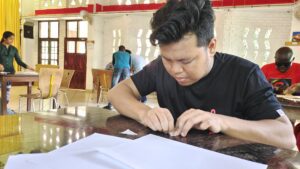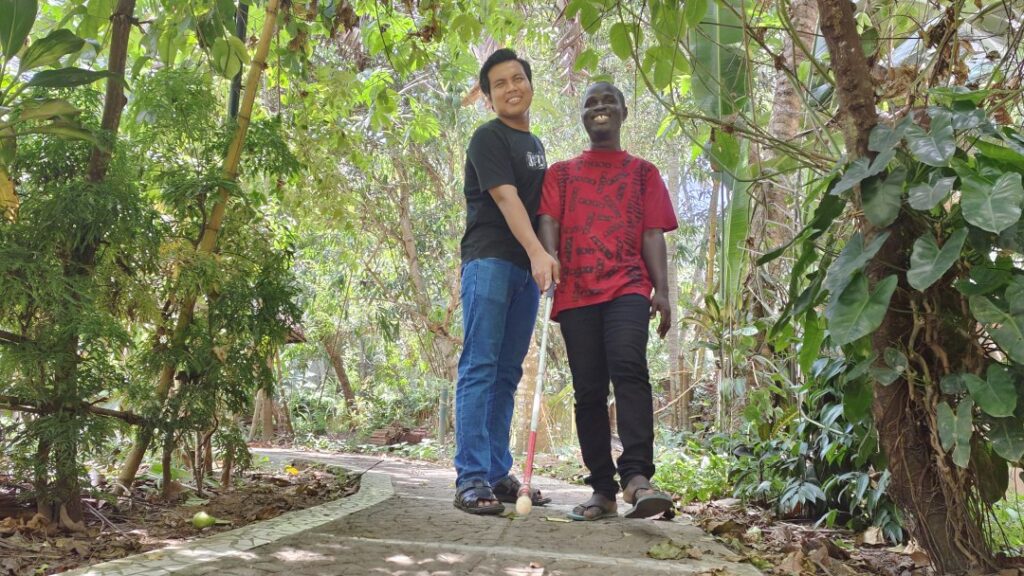Summary
Bone Sit Paing Hmoo hails from Myanmar,
At the age of 13, he became blind. Fortunately, he could continue his education in a special school. After school, he experienced the frustration of having no job perspectives besides massage. Many blind youth feel like him. Therefore, Bone wants to provide training to empower the blind with basic abilities to make the right choices and to be fit to integrate into any new work environment.
read his blogpost below.
Blind youths Myanmar
A Life-Altering Accident: From Football Dreams to Blindness
I remember the incident as if it was yesterday. When I turned 17 years old, I had enough. Enough from being prepared for a future without an interesting job perspective. I wanted to quit high school and, like many other blind youths, learn massage, the only option for the visually impaired in Myanmar! Luckily, my parents, teachers, and friends, persuaded me to continue. One teacher said: “You need education to be able to dream about different professions.” This statement made me question my decision and I continued high school, although my dreams were already damaged, a long time ago.
The Struggle to Accept a New Identity
Before I became blind, I wanted to be a football player. Growing up in a village in Rakhine state, a coastal area, famous for its beaches, I was a very active and playful child. Day by day, I was found on the football pitch or swimming in the flooded paddy fields. And then…, there was the accident that turned my life and my dreams upside down. At the age of ten, during a football-match, I got tackled and fell on my head. From that moment onward, I gradually lost sight in both eyes. Even two major surgeries didn’t help. By the age of 13, I was totally blind.

The Turning Point: Choosing Education over Isolation
Initially, I was not able to accept my new identity, it was difficult for me to adapt to blindness, and I felt isolated. During this time, an uncle informed me about a boarding-school for the blind. But back then I was not ready to accept that this would be an option. Later, my friend came by, and he spoke about the fun they had being in school. That gave me a push. I also wanted to be a student and I envisioned how exciting my life could be while continuing my education.
Educational Challenges and Frustrations
For a few years I had not been able to go to school and I was hungry for gaining knowledge and skills. In 2012, I started a new life in a boarding school in Yangon. Academically, the school was excellent, and I learned a lot. But besides Braille they didn’t teach us any techniques for the blind, no mobility and orientation, no daily living skills. Whenever we wanted to test our independence and we tried to sneak out with our white canes, they held us back, like birds in a cage.
Frustration among us, the visually impaired youngsters, grew slowly but steadily. We felt there was no future, no opportunities for us. No matter how hard we would study, we would anyway end up in a massage clinic, since that was the only possible job-option for us.
Academic Success and Limited Opportunities
In 2017, I passed my final exam with good grades. In two subjects, in history and economy, I even passed higher than any of the sighted students. But still my job opportunities were limited. I tried higher studies, but I felt it was going nowhere. And yes, in the end, I landed back in a training facility for massage. For more than a year I learned and earned my salary through massage, but it was not satisfying. Later, I got a job in the Myanmar National Association of the Blind, where I was responsible for implementing projects and organizing trainings.
Empowering the Blind: The Birth of Canedom
Through my job I observed that there were many blind youths who, like me, had potential but didn’t see any other future than being a masseur. And while they remained being frustrated, I could learn technical skills for the blind, and basics of project management, administration, computer skills and audio editing. But we, who learned all these skills, still missed out on self-confidence and the ability to communicate.
In fact, we were not able to combine whatever we had learned. And slowly my dream developed: First, I had the idea to train the blind to become phone operators in a call centre. Going through concept-transformation in the kanthari institute I realized, this would just replace one stereotypical job with another.
The Vision for a Brighter Future: Empowering Blind youths Myanmar
Today, through my organisation Canedom, I want to provide training to empower the blind with basic abilities that anyone needs to stand up in life, to make their own career choices, to be open to learn and to be fit to integrate oneself into any new work environment.



